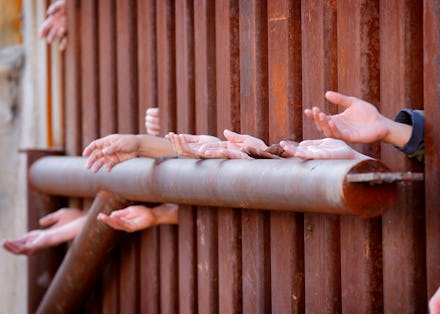There's an Unprecedented Crisis at the Border, Killing Those Who Need Help Most

47,000.
That's how many unaccompanied children were detained crossing Mexico's border into the U.S. since October 2013.
According to Yahoo News, that's over seven times the 6,560 taken into custody in all of 2011, and 13,000 short of the 60,000 expected by the year's end. The Houston Chronicle claims that 400 were caught in Texas' Rio Grande Valley on a single day last week.
As of Monday, President Barack Obama has declared this "an urgent humanitarian situation."
Image Credit: AP
What's going on? Two reasons have been cited for this startling influx.
First, many children are trying to reunite with family members who've already made it to the U.S. As it stands, recent economic growth in nations like Honduras — where almost 60% of the population lives in poverty — has been largely attributed to money sent home by migrants. This makes the prospect of reunification a more stable and appealing option for children.
The second reason is more sobering. Yahoo News reports that 90% of the kids cared for by the Office of Refugee Resettlement after border crossing attempts have been from El Salvador, Guatemala or Honduras. In these cases, National Bureau for Migration coordinator Julia Gonzalez says an "important theme is migration because of insecurity."
The manifestations of this "insecurity" are simple: Aside from poverty rates ranging from 40-60%, all three countries face street gang epidemics, widespread organized crime and drug trafficking that place them among the world's most violent places. In Honduras, the murder rate is 90.4 homicides per 100,000 people — the highest in the world.
Image Credit: AP
More: A March study from the United Nations High Commissioner for Refugees adds that half of the 400 detained Central American children they interviewed claimed they'd "experienced or been threatened with serious harm" back home.
"There is so much poverty there, the crime is tremendous," a 14-year-old Honduran migrant named Brian Duran told Yahoo. "You've got to sort things out, because if not, you'll starve to death."
The route: To escape the violence, growing numbers of children are braving a treacherous, sun-baked path through the deserts of northern Mexico and the American Southwest. Following sharp increases in border patrol personnel under Bush and Obama, crossing options are increasingly limited, and often deadly. The 2,100 migrants who've died traversing Arizona's deserts since 2001 are a grim reminder of this.
"It's not a clean death," writes Al Jazeera's Erin Siegal McIntyre. "Dying from what coroners call exposure to the elements can be brutally elongated," and often includes heatstroke, hallucinations and a literal frying of the body's nervous system.
Image Credit: AP
Detention centers: So the lucky ones make it across, while the less fortunate die. Somewhere in between are the thousands of children being held in Border Patrol detention centers and Air Force bases across Texas, New Mexico, Arizona and California.
Federal law requires these unaccompanied minors to be turned over to the Office of Refugee Resettlement within 72 hours. Lately, however, this has been impossible. Their skyrocketing numbers have created a clogging effect whereby children are being caught faster than they can be processed and released. Today, the backlog in the Rio Grande Valley alone stands at 2,000.
To make matters worse, the Houston Chronicle reports that long-term overflow confines these kids to holding cells popularly known as "hieleras," or "iceboxes." Aside from their cold nighttime temperatures, these cells usually lack beds, forcing children to sleep on hard floors or concrete benches for nights on end.
What's being done? President Obama has called on FEMA to provide more housing and medical care for the kids, but considering the reasons behind their influx — the poverty, violence and long-term family separation — this solution seems merely cosmetic.
Their circumstances are fuelled by a confluence of policy and poverty, and a consequent violence that's forced them to choose between a mayhem-wracked homeland and a northern neighbor that's done everything to assure them they are unwanted. It's an unenviable choice for anyone to face, and these kids face it in unprecedented numbers every day.
That they're children just makes it all the more devastating.